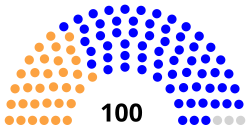Senate of Poland
|
Senate of the Republic of Poland Senat Rzeczypospolitej Polskiej |
|
|---|---|
| 9th term | |
 |
|
| Type | |
| Type | |
| Leadership | |
| Structure | |
| Seats | 100 senators |
 |
|
|
Political groups
|
Official Opposition (33)
Others (3)
|
| Elections | |
| First-past-the-post | |
|
Last election
|
March 2016 |
| Meeting place | |
 |
|
| The Sejm Building Śródmieście, Warsaw |
|
| Website | |
| senat.gov.pl | |
Government (64)
Official Opposition (33)
Others (3)
The Senate (Polish: Senat) is the upper house of the Polish parliament, the lower house being the 'Sejm'. The history of the Polish Senate is rich in tradition and stretches back over 500 years. It was one of the first constituent bodies of a bicameral parliament in Europe and existed without hiatus until the dismemberment of the Polish state in 1795. After a brief period of existence in the inter-war period the Senate was again abolished (by many accounts illegally) by the authorities of the People's Republic of Poland. It was not re-established until the collapse of communism and rebirth of democracy in Poland in 1989. The Senate is based in Warsaw and is located in a building which forms part of the Sejm Complex on Ul. Wiejska, close to Three Crosses Square and Ujazdow Castle. It consists of 100 senators elected by universal ballot and is headed by the Marshal of the Senate (Marszałek Senatu). The incumbent Marshal of the Senate is Senior Marshal Stanisław Karczewski.
In line with Article 10, Paragraph 2, and Article 95 of the Polish Constitution of April 2, 1997, the Senate and the Sejm exercises legislative power. The Senate is composed of 100 senators who are elected for a term of four years in general election in a direct vote by secret ballot. Alongside the Sejm, the President of the Polish Republic, the Council of Ministers and all citizens of Poland, the Senate has the right to take legislative initiatives.
If it is necessary for the Sejm and Senate to convene jointly as a general session of the National Assembly, this joint session will be chaired by the Marshal of the Sejm or by the Marshal of the Senate. The Senate is allowed 30 days to examine any piece of draft legislation passed by the Sejm, 14 days if a bill is considered to be urgent. Any bill submitted by the Sejm to the Senate may be adopted by the latter without any amendments or amended or rejected. Any resolution of the Senate, as a result of which a bill is repealed or amended, is considered to be passed provided it has not been rejected by the Sejm.
...
Wikipedia
